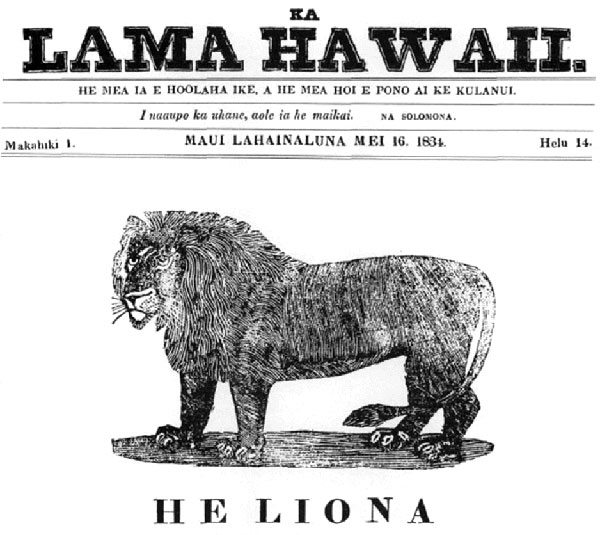
February 5, 2018; Honolulu Civil Beat
Professor Samuel Kaleikoa Kaʻeo speaks Hawaiian and English, but when he defended himself in a Hawaiian court of law, he saw no reason to default to English, the language of Hawai‘i’s conquerors. Though Hawaiian is an officially recognized language in the state, the court disagreed and issued a bench warrant against him. Since then, thanks to the work of activists on the island, the court has been forced to rescind the warrant and revise its policy.
Kaʻeo was defending himself against misdemeanor charges related to his protest against telescope construction atop Haleakalā, a 10,000-foot mountain on the island of Maui, which, like the Standing Rock protest in North Dakota last year, is an issue of indigenous sovereignty that activists say is being ignored. Ka‘eo asked Honolulu Civil Beat, “Where is it coming from, this idea that I can only be heard if I speak the language of those who have done so much wrong to me?”
According to Hawai‘i Public Radio, a 1993 case “found that if the person requesting an interpreter can speak English, his or her due process rights are protected, and that the mere fact that ʻōlelo Hawaiʻi is an official state language does not compel the court to ignore the practical realities of the dispute.” In other words, if the defendant speaks English, the court is not obliged to provide a translator or otherwise facilitate the speaking of Hawaiian, even if it is the defendant’s first or preferred language. Ninety percent of Hawaiian speakers on the islands also speak English, so there is only one Hawaiian interpreter.
However, Kaʻeo says, “There are things you can say in Hawaiian that you know really express through our cultural view of why it’s important for us to defend our sacred sites.” The defendant in 1993, Kaho’okahi Kanuha, argued similarly that English is the foreign language on Hawai‘i and it wasn’t the Hawaiian speakers who needed interpreters.
Hawai‘i was a US territory like Puerto Rico or Guam from 1898 until it became a state in 1959, and a British protectorate before that, with an indigenous ruler who had increasingly little power; Queen Liliʻuokalani ceded control in 1893. The Hawaiian language was nearly eradicated by colonization tactics similar to those used in Canada, Australia, and the US, such as disproportionate funding to English-speaking schools and the outlawing of native languages in certain settings. Slate reports, “By the early 1980s, fewer than 50 people under age 18 could speak Hawaiian fluently, according to state expert’s estimates.”
Sign up for our free newsletters
Subscribe to NPQ's newsletters to have our top stories delivered directly to your inbox.
By signing up, you agree to our privacy policy and terms of use, and to receive messages from NPQ and our partners.
Thanks to organizations like the Hawaiian Historical Society, Na Leo Kako O Maui, and especially the ‘Aha Pūnana Leo and Kula Kaiapuni immersion programs, there are now 18,600 Hawaiian speakers on the island, still a small percentage of its 1.4 million residents or even the nearly 300,000 people in Hawai‘i (and an estimated 560,000 nationally) who identify as native Hawaiian, but a significant improvement.
The issue now, according to activists like Kaʻeo, is moving the language from a cultural relic to a living and integral part of the state’s culture. Allocating interpreters for one official language (English) but not the other makes English the default language on an island where less than 25 percent of the population is white.
“The Court’s action yesterday is inexplicable and nonsensical given the judiciary’s ultimate obligation to ensure the mere appearance of prejudice has no place in this sacred institution,” said the Native Hawaiian Legal Corporation. Office of Hawaiian Affairs CEO Kamanaopono Crabbe added, “That a Native Hawaiian was nearly arrested for speaking his mother tongue in 2018 indicates that despite the substantial progress made to revive the Hawaiian language over the years, we still have much further to go.”
In court documents, the prosecutors argued that “The practical realities of requiring an interpreter this case would cause needless delay in the trial process and an unnecessary expense.” But calling the expense “unnecessary” is a judgment based on a certain value set, one that indigenous activists do not share with the court. The importance of preserving their living language, especially when so much else has been lost (including the fight to keep the telescope off Haleakalā), has motivated the founding of dozens of organizations and educational programs. William Wilson, a Hawaiian language professor, says, “It’s about the right to exist as a full language in your own place.”
Following Kaʻeo’s brush with the judicial warrant, members of the Hawaiian Senate proposed a bill requiring that the court “will provide or permit qualified Hawaiian language interpreters to the extent reasonably possible when parties in courtroom proceedings choose to express themselves through the Hawaiian language.” Not only that, but it appropriates funds to translate the state constitution into Hawaiian.
In the past, native Hawaiians have been berated for conduct unbecoming the court for speaking their native language during a trial. Kaʻeo was fortunate to have protestors, nonprofits, and state representatives on his side this time. He is still awaiting the outcome of his trial.—Erin Rubin













